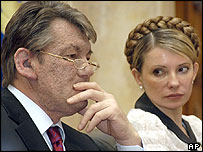
ORANGE REVOLUTION LEADERS DECIDE TO RE-UNITE
Publication: Eurasia Daily Monitor Volume: 3 Issue: 70
By:

After weeks of difficult consultations, the Our Ukraine bloc of President Viktor Yushchenko, the Yulia Tymoshenko Bloc, and the Socialist Party have decided to re-establish their alliance. On April 10, they launched talks on the shape of a cabinet coalition. Our Ukraine rejected coalition proposals from the opposition Party of Regions (PRU) of former presidential contender Viktor Yanukovych. The main intrigue now is whether Tymoshenko will succeed in persuading the coalition partners to give her back the post of prime minister, from which Yushchenko sacked her in September 2005.
Two weeks ago, Our Ukraine seemed close to forming an alliance with the PRU. “There is a threat that a coalition between Our Ukraine and the Party of Regions will be set up,” a visibly angry Tymoshenko warned at her press conference on March 30. She said that certain influential people in Yushchenko’s team were in favor of a coalition with Yanukovych. She meant the pragmatic business wing of Our Ukraine, who apparently preferred a marriage of convenience with the PRU to Tymoshenko as prime minister. Tymoshenko accused several of them of corruption last year, but failed to prove her accusations in court.
Tymoshenko did not back down on her main demand, reiterating at the same press conference that she would not drop her prime ministerial ambition. In her recent interviews and comments, she has repeatedly said that an alliance between Our Ukraine and the PRU would not be the unification of the east and the west of Ukraine, but “a unification of the old and new clans,” and that the post of prime minister has to belong to her because only she knows “how to implement deep reforms.” She, however, did not hurry to dispel the fears both at home and abroad that her return would trigger a resumption of the infamous reprivatization process that scared many investors last year.
The PRU failed to take advantage of the standoff between Tymoshenko and Yushchenko. Even the most pragmatic members of Our Ukraine must have been taken aback by the conditions for a government coalition that the PRU presented on April 5. Their claims far exceeded those made by Tymoshenko — not only the prime minister’s chair, but also the positions of first deputy prime minister, deputy prime minister for energy, and leading positions in “the ministries that shape the budget and the economic system,” probably meaning the ministries of finance and economics.
The PRU’s enormous ambitions must have made it an easy job for the principled supporters of the Orange Revolution coalition in Our Ukraine, who have always argued that an alliance with the PRU is impossible because of different views on democracy, to take an upper hand. On April 6, the political council of Yushchenko’s People’s Union-Our Ukraine party — which is the core of Our Ukraine — voted in favor of a coalition with Tymoshenko and the Socialists. The council ruled that the PRU may not be part of the coalition. Even the council’s chairman, Roman Bezsmertny, whose personal relationship with Tymoshenko has been far from warm, conceded, speaking at the “Freedom of Speech” show on ICTV that unification between the orange forces and the PRU “would be naturally impossible.” Earlier on the same day, he admitted that Tymoshenko might return to prime minister’s chair. And Yushchenko’s chief aide Oleg Rybachuk said in an interview with Profil that Tymoshenko might be given another chance.
In a radio address to the nation on April 8, Yushchenko made public Our Ukraine’s conditions for an alliance with Tymoshenko. These are “improving the constitution” — meaning reversal of the constitutional reform enhancing parliament’s authority at the expense of the president’s, which came into effect this year — and implementing Yushchenko’s action plan for economic development.
Yushchenko’s conditions did not discourage Tymoshenko. On April 10 she took part in the first round of coalition talks with Bezsmertny and Socialist leader Oleksandr Moroz. Addressing journalists after the talks, Tymoshenko said it was agreed that the coalition would be formed on the basis of a memorandum that was drafted by Our Ukraine before the election, stipulating that the party within the coalition receiving the most votes in the election shall be entitled to nominating the prime minister. Tymoshenko’s bloc scored more votes than Our Ukraine. This should mean that Tymoshenko will likely get the coveted post back.
In return backing her bid for prime minister, Our Ukraine apparently expects from Tymoshenko her bloc’s support in reversing the constitutional reform in order to strengthen Yushchenko’s positions vis-à-vis parliament, as well as some kind of control over her activities in the cabinet — hence the demand to implement Yushchenko’s action plan — in order to prevent unwanted developments such as indiscriminate reprivatization and pressure on businesses, of which Tymoshenko’s opponents held her responsible last year. Coalition talks will continue from April 12, and it remains to be seen whether Tymoshenko will be happy with these conditions.
(Channel 5, March 30, 31, April 6, 10; Ukrayinska pravda, April 5, 6; ICTV, April 7; 1+1 TV, April 7, 10; Ukrainian radio, April 8; Profil-Ukraina, For-ua.com, April 10)




